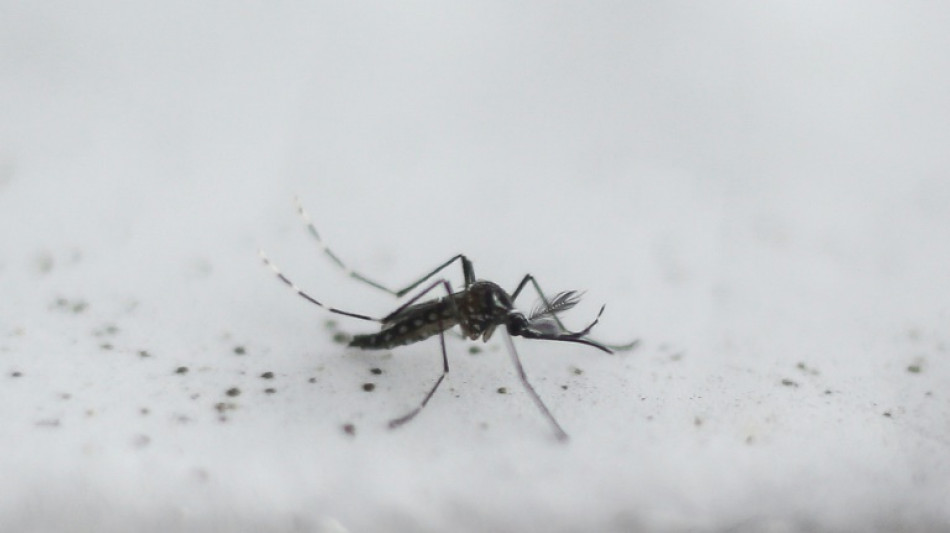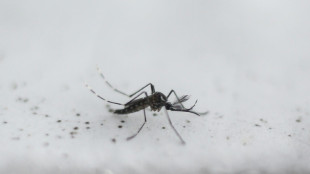
-
 Texans cruise as Cowboys crisis deepens
Texans cruise as Cowboys crisis deepens
-
Do the Donald! Trump dance takes US sport by storm

-
 Home hero Cameron Smith desperate for first win of 2024 at Australian PGA
Home hero Cameron Smith desperate for first win of 2024 at Australian PGA
-
Team Trump assails Biden decision on missiles for Ukraine

-
 Hong Kong court jails 45 democracy campaigners on subversion charges
Hong Kong court jails 45 democracy campaigners on subversion charges
-
Several children injured in car crash at central China school

-
 Urban mosquito sparks malaria surge in East Africa
Urban mosquito sparks malaria surge in East Africa
-
Djibouti experiments with GM mosquito against malaria

-
 Pulisic at the double as USA cruise past Jamaica
Pulisic at the double as USA cruise past Jamaica
-
Many children injured after car crashes at central China school: state media

-
 Asian markets rally after US bounce as Nvidia comes into focus
Asian markets rally after US bounce as Nvidia comes into focus
-
Tens of thousands march in New Zealand Maori rights protest

-
 Five takeaways from the G20 summit in Rio
Five takeaways from the G20 summit in Rio
-
China, Russia ministers discuss Korea tensions at G20: state media

-
 Kohli form, opening woes dog India ahead of Australia Test series
Kohli form, opening woes dog India ahead of Australia Test series
-
Parts of Great Barrier Reef suffer highest coral mortality on record

-
 Defiant Lebanese harvest olives in the shadow of war
Defiant Lebanese harvest olives in the shadow of war
-
Russian delegations visit Pyongyang as Ukraine war deepens ties

-
 S.Africa offers a lesson on how not to shut down a coal plant
S.Africa offers a lesson on how not to shut down a coal plant
-
Italy beat Swiatek's Poland to reach BJK Cup final

-
 Japan, UK to hold regular economic security talks
Japan, UK to hold regular economic security talks
-
Divided G20 fails to agree on climate, Ukraine

-
 Can the Trump-Musk 'bromance' last?
Can the Trump-Musk 'bromance' last?
-
US to call for Google to sell Chrome browser: report

-
 Macron hails 'good' US decision on Ukraine missiles
Macron hails 'good' US decision on Ukraine missiles
-
Italy eliminate Swiatek's Poland to reach BJK Cup final

-
 Trump expected to attend next Starship rocket launch: reports
Trump expected to attend next Starship rocket launch: reports
-
Israeli strike on Beirut kills 5 as deadly rocket fire hits Israel

-
 Gvardiol steals in to ensure Croatia reach Nations League quarter-finals
Gvardiol steals in to ensure Croatia reach Nations League quarter-finals
-
Thousands march to New Zealand's parliament in Maori rights protest

-
 China's Xi urges G20 to help 'cool' Ukraine crisis
China's Xi urges G20 to help 'cool' Ukraine crisis
-
Church and state clash over entry fee for Paris's Notre Dame

-
 Holders Spain strike late to beat Switzerland in Nations League
Holders Spain strike late to beat Switzerland in Nations League
-
Stocks, dollar hesitant as traders brace for Nvidia earnings

-
 Swiatek saves Poland against Italy in BJK Cup semi, forces doubles decider
Swiatek saves Poland against Italy in BJK Cup semi, forces doubles decider
-
Biden in 'historic' pledge for poor nations ahead of Trump return

-
 Sudan, Benin qualify, heartbreak for Rwanda after shocking Nigeria
Sudan, Benin qualify, heartbreak for Rwanda after shocking Nigeria
-
Five dead in new Israeli strike on Beirut's centre

-
 Where's Joe? G20 leaders have group photo without Biden
Where's Joe? G20 leaders have group photo without Biden
-
US permission to fire missiles on Russia no game-changer: experts

-
 Tropical storm Sara kills four in Honduras and Nicaragua
Tropical storm Sara kills four in Honduras and Nicaragua
-
Germany, Finland warn of 'hybrid warfare' after sea cable cut

-
 Spanish resort to ban new holiday flats in 43 neighbourhoods
Spanish resort to ban new holiday flats in 43 neighbourhoods
-
Hong Kong to sentence dozens of democracy campaigners

-
 Russian extradited to US from SKorea to face ransomware charges
Russian extradited to US from SKorea to face ransomware charges
-
Phone documentary details Afghan women's struggle under Taliban govt

-
 G20 wrestles with wars, 'turbulence' in run-up to Trump
G20 wrestles with wars, 'turbulence' in run-up to Trump
-
Kane hoping to extend England career beyond 2026 World Cup

-
 Gazans rebuild homes from rubble in preparation for winter
Gazans rebuild homes from rubble in preparation for winter
-
'Vague' net zero rules threaten climate targets, scientists warn


Djibouti experiments with GM mosquito against malaria
Tens of thousands of genetically modified mosquitos are being released every week in Djibouti as the tiny Horn of Africa state experiments with a new weapon against an unprecedented malaria surge.
East Africa faces a deadly new threat from the arrival of Anopheles stephensi, a mosquito native to Asia and the Middle East that thrives in urban areas and is immune to insecticides.
The World Health Organization (WHO) says the species is a key factor in an unprecedented spike in malaria cases in Djibouti and Ethiopia, and has been found in six other African countries so far.
In 2019, Abdoulilah Ahmed Abdi, health adviser to Djibouti's presidency, heard about a new invention being used primarily in Brazil against a dengue-carrying mosquito.
The so-called "Friendly" mosquito, created by British biotechnology firm Oxitec, is a genetically modified male that carries a protein ensuring its offspring will not survive.
Since only females bite, the idea is that GM males can be released in vast numbers without posing an additional risk to humans.
Djibouti launched the programme in May with the release of 40,000 GM mosquitos and on October 6, began weekly releases that will run for six months.
"We are trying to find with our partner Oxitec an innovative and sustainable solution that could have an impact on the whole region and the continent at large," said Abdi.
"We are very proud of it. It's an initiative for all Africa," he added.
Abdi said results were expected by mid-2025 and that Djibouti was also building a factory to produce the mosquito for shipment across Africa.
- Hopes and challenges -
Oxitec has released well over one billion GM mosquitos in Brazil and Florida in the United States, where it targets the dengue-carrying Aedes aegypti.
Its studies indicate it can reduce wild populations by 90 percent or more.
"There's nothing better at finding the biting disease-transmitting female mosquito than a male mosquito," Neil Morrison, Oxitec's chief strategy officer, told AFP.
He emphasised the Djibouti programme was still at a pilot stage.
"Early next year, we'll start to figure out how many mosquitoes we'll need to release to deliver suppression," he said.
GM mosquitos are controversial with some environmentalists.
A 2019 report led by GeneWatch UK said Oxitec's technology risked altering the evolution of mosquitos and the way diseases spread, in potentially dangerous ways.
It questioned Oxitec's claims of efficacy, saying it could inadvertently release many females alongside its sterile males, or simply push wild mosquitos into neighbouring areas.
Oxitec insists its GM mosquito is "completely harmless and non-toxic" and regulators cleared it for deployment in the US in 2022.
But if GM mosquitos must be continuously released to be effective, there is the question of cost -- a key factor in Africa, which accounts for around 95 percent of the 600,000 malaria deaths each year.
Oxitec refused tell AFP how much its mosquitos cost to governments and private buyers.
Outside experts are taking a wait-and-see approach.
"We are very supportive of innovation," said Dorothy Achu, WHO's head of tropical and vector-borne diseases in Africa.
She said WHO was working on a regulatory framework to measure the impact of GM methods.
"Initial results are very promising but we need things that are sustainable over time and we need impact on wide areas," said Achu.
S.Keller--BTB



